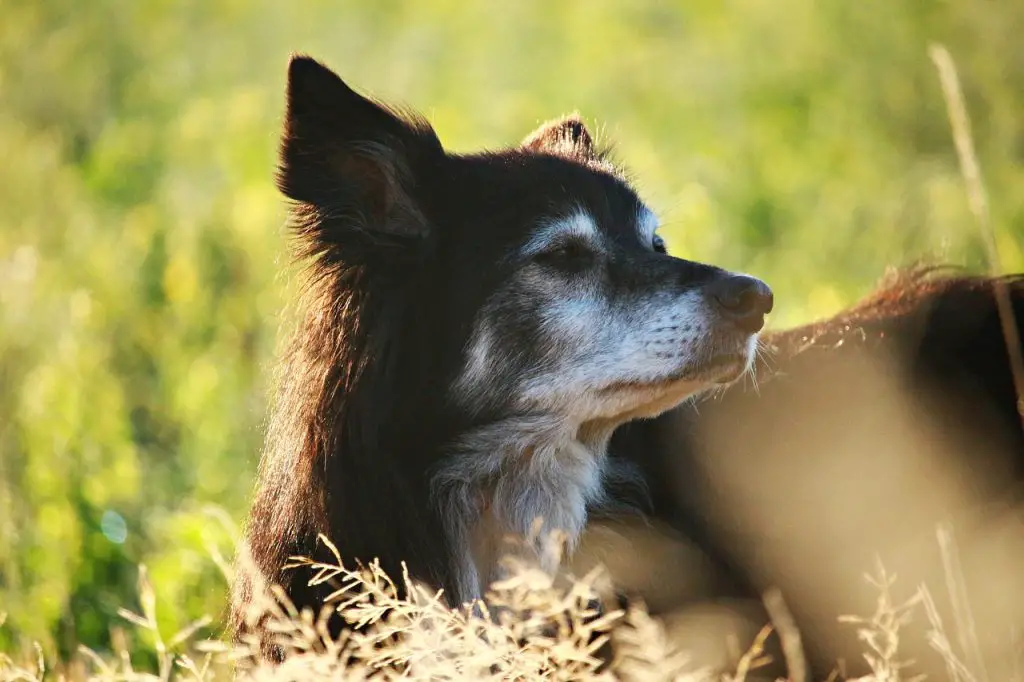Table of Contents
If your pup is entering his later years, then for sure you have a lot to be concerned about. Dogs, just like any other living being, age. And as they age, they begin to experience the effects of getting older. Things such as confusion and disorientation, for example. What’s more is that elder dogs become more at risk for things such as chronic kidney disease and other similar conditions. But what if I told you that it wasn’t just elder dogs’ bodies at risk? What if I told you that elder dogs do suffer from other things too, particularly conditions of the brain? Things like doggie dementia or cognitive dysfunction do exist, and can be problematic if left to progress unchecked. But what exactly are the dog dementia early signs you need to be aware of?
Dog dementia, more practically known as cognitive dysfunction, affects a large percentage of dogs over a certain age. To be honest, for dogs that are aged eleven to twelve, the occurrence rate of cognitive dysfunction is around forty-five to forty-six percent. Pretty crazy if you think about it, considering that’s almost half of the dog population at that age. What’s worse is that the incidence of dog dementia increases astronomically in dogs aged fifteen to sixteen. From 45-46%, the incidence rate climbs all the way up to eighty-six percent. Yep… almost all senior dogs lucky enough to make it to fifteen end up with doggy dementia.
Why Should You Be Prepared for Doggy Dementia?

Adopting a dog is certainly a large responsibility. After all, they are a living, breathing being that you must now care for for the rest of their lives. Dogs offer you tons of love, affection, and companionship. And for this, all they require in return (in most cases) is food, shelter, and exercise. When you take that dog home, you basically sign on to take care of a dog for the rest of their life. This is essentially why it’s so incredibly important that you are able to make the commitment. So many take dogs home only to give them up after realizing they couldn’t handle the responsibility.
Once you have taken your new dog home, you have signed on to care for them. Not just when they are young and vivacious, but even when they are older and more relaxed. And so, you should be preparing yourself to be able to care for a dog that has entered its twilight years. Part of this preparation is learning more about dog dementia early signs.
While we can’t really enforce that all dog owners learn more about this topic as they adopt their dogs, we can at the very least attempt to inform more people. This is basically why we have written this guide to let pet owners know about the signs and symptoms of CD. CD being cognitive dysfunction, of course. The more people we inform about this condition, the more people will know how to spot the signs. And of course, when more people know about CD, more people will also know how to care for dogs that are progressing on a cognitive decline.
Dog Dementia
Before we get talking about dog dementia early signs and symptoms that you must watch out for, we do need to give Dog Dementia a quick mention. Not a lot of people are aware that Dog Dementia exists. Yes, just like humans, our dogs can and will develop degenerative conditions that affect brain function as they get older. Dog dementia is somewhat similar to Alzheimer’s Disease or perhaps dementia in human elders. In essence, it is a condition that begins to affect dogs as they hit their twilight years. This condition is very likely what makes people call a dog senile.
Dog dementia is also called cognitive dysfunction. It is also known as canine cognitive dysfunction syndrome, but for the purposes of this discussion we will call it CD. CD is much like Alzheimer’s in humans because it can cause similar symptoms. You will probably notice listlessness, anxiety, confusion, forgetfulness, and more. This condition affects the brain function of dogs, which means you may see more neurologically-related symptoms later on down the line.
Prevention of Cognitive Dysfunction
Now you could be wondering – is there any way to prevent dog dementia? Well, the short and long answer of it is… no. Unfortunately, there is no real way to prevent cognitive dysfunction in dogs. There are some things that you can do, however, to set up your dog for his later years. You can establish a proper routine, give them proper exercise, and feed them high quality food. You can also supplement their diet and make sure they are getting all of the nutrition that they need. These are the things that you can do to set yourself up for an easier time managing CD should your dog be one of the unlucky many who end up developing it.
Treatment of Doggie Dementia
Well, since you cannot prevent cognitive dysfunction, the next question now is: can it be cured? We are sad to report that unfortunately the answer is no. It cannot be cured – there is no medicine or procedure that will magically fix it. However, there is something that you can do: it can be managed. Doggy dementia can be managed by establishing a proper routine for your dog. Make sure that you get everything on a schedule, so that anxiety can be lessened for your dog. Furthermore, you can put your dog on a special diet.
This special diet can be given to you by your vet; just make sure that you ask them for advice. Additionally, you can also ask your veterinarian if there are any vitamins and supplements they can prescribe. According to some sources, Omega fatty acids (3 and 6) are rather helpful in this situation.
Finally, you can make sure your dog has daily mental stimulation. Enrich their home environment with toys and the like. Play with them and practice (or teach) new tricks.
Of course, for best results in treating this condition, it’s best to find out dog dementia early signs so that you can make an early diagnosis.
Dog Dementia Early Signs and Symptoms

Well, now that we’ve talked about Cognitive Dysfunction enough to understand it, it’s time to talk about dog dementia early signs and symptoms that you need to know. There are quite a few of them, but many are easy to confuse with the normal signs of dogs beginning to age. Therefore, you should be more vigilant when checking for these signs. If you begin to notice more than a couple of them at a time, it might be a good idea to bring your dog in for testing and diagnosis as soon as possible. Without further ado, here are the dog dementia early signs.
Pacing and Wandering That is Seemingly Aimless
As dogs get older, they end up getting a tendency to become disoriented and confused. This can lead to your dog endlessly pacing back and forth or wandering around in confusion. It may look as though they are lost or confused right in your own home, where they’ve spent their entire life. When this occurs, especially in conjunction with the other dog dementia early signs, you may have something to worry about.
If your dog looks rather disconcerted, or if they look as though they are “stuck”in a corner or some other… they may just be developing CD. This condition can confuse and lead to difficulty with recognizing daily routine. To counter this, you can put your dog on a more stringent routine. That way, you can combat disorientation and the resulting anxiety.
Changes in Interaction
Dog dementia early signs can include changes in the way that they interact with you. As they get older, their personalities might begin to change. As a result, you may notice some changes in the way that they interact with your family and other familiar animals. The best way to differentiate, of course, is by keeping track of the interactions between yourself and your pet. The relationship between dog and owner is the best way of gauging any changes.
If your dog begins to act afraid, anxious, and withdrawn, this can certainly be one of dog dementia early signs.
Forgetting House Training
The next thing on the list of dog dementia early signs is forgetting house training. If your pooch is suddenly wetting or eliminating in the house, it could indeed be a cause for concern. This is especially true if your dog generally never used to have any problems with house training. Sometimes, your dog really just couldn’t hold their bladder. Therefore, one or two incidences of house soiling might not be anything to worry about. However, if it begins to happen rather regularly, it may be time to consult a vet. It could be either the onset of CD, or it could also be a problem with their kidneys or bladder. It could also be a sign of gastrointestinal problems, too.
More Sleeping, Changed Schedule
As dogs get older, they do end up slowing down – just like we do! Because of this, it may not be too odd to notice them starting to nap and snooze more. However, if they are spending almost all day asleep and then staying awake all the rest of the night, it may be a sign of CD. Dogs that are beginning to grow senile can feel listless and restless at night. This is because they do begin to get more confused and disoriented, losing track of their own routines and schedules.
Getting Aggressive
If your dog is suddenly getting aggressive when they formerly weren’t, it certainly can be a sign of CD. Bring them to the veterinarian so that they can be assessed for any issues. Otherwise, your vet can also make the assessment on whether they have CD or not.
Other Signs
There are a few other things that you can maybe consider to be dog dementia early signs. Some of these are whining and pacing, which might actually worsen at night.They might also look as though they have zoned out and are staring into space. They might even stare at the wall as though it was the most interesting thing in the world. Furthermore, they can even start losing interest in a lot of things that they formerly used to love.
If your dog stops caring about play or going for walks when formerly these were activities they used to love greatly, it’s time to talk to your veterinarian!
Conclusion
Dog dementia early signs and symptoms are easily confused with normal signs of aging. However, it’s important that you become more vigilant as your pooch enters his twilight years. This way, you will be able to get in front of any problems they may have. Regardless of whether it is cognitive dysfunction or something else, you will be able to give your pooch the love and care that they need for the rest of their days. We hope that you found this article helpful, especially if you are suspecting CD in your pup!
